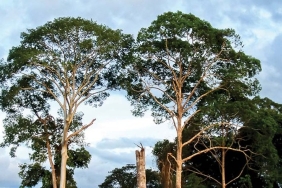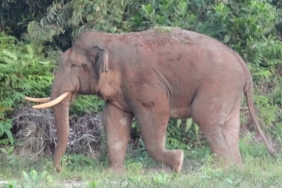MANGROVE REHABILITATION AROUND PT BOMAR PARTNER PONDS, FOR SUSTAINABLE SHRIMP FARMING IN PINRANG
By: Zulkarnain (Pinrang Shrimp Aquaculture AIP Local Facilitator)
Mangroves are inseparable from a successful aquaculture practice. Environmental quality affects the production of aquaculture products, especially the water quality factor. The carrying capacity of mangroves in the coastal environment, especially in aquaculture areas, is very important.
Mangroves act as a buffer zone and filter for water entering the pond. It is also a critical habitat for a wide variety of creatures, both protected and unprotected.
Understanding the urgency, 180 mangrove trees were planted on 06/07/2017 in the pond area owned by H. Tantang, Pallameang-Langnga Village, Mattirosompe District, Pinrang Regency, South Sulawesi.
WWF-Japan, JCCU-Japan (shrimp importing company), Pinrang District Government in this case the Pinrang Regent, Pinrang Marine and Fisheries Service, Mattirosompe District Fisheries Extension Officer, to the Deputy Governor of South Sulawesi participated in this mangrove planting event.
WWF-Indonesia together with PT Bogatama Marinusa (Bomar), a company that is a member of the Seafood Savers program, which oversees the planting of mangroves in the pond waterways of PT Bomar's partners. This is part of the effort to encourage the improvement of sustainable shrimp aquaculture, referring to the ASC (Aquaculture Stewardship Council) standard.
ASC is a certification standard ecolabel which is considered good and accommodates a variety of issues in the world of aquaculture, such as issues of legality, environment, social community, social workers, technical improvements in aquaculture, as well as the issue of the source of fry and feed raw materials. Planting mangroves is the main agenda in improving the quality of the environment around shrimp ponds.
"One way to maintain environmental quality is by planting mangroves on shrimp ponds," said Wawan Ridwan, Coral Triangle Director of WWF-Indonesia, in his speech at the event. "Good environmental quality can increase shrimp production. For this reason, in order to protect the environment, there needs to be support and cooperation from the government, NGOs, companies and the community," he added.
The head of PT Bomar, Tigor Cendarma, is committed to continuing the mangrove planting program. PT Bomar also plans to make a new breakthrough by establishing a hatchery company to produce tiger shrimp fry with a disease-free guarantee.
Matsumoto from JCCU - Japan, a shrimp importer in Japan, expressed his appreciation to shrimp farmers and PT Bomar for supporting the production of quality tiger shrimp. "In supporting shrimp farming activities to be even better, we will work together with the shrimp farming community," said Matsumoto.
Head of the Pinrang Fisheries Service, Ir. Budaya, also expressed his support, "Pinrang Regency Government strongly supports the rehabilitation of mangroves and the implementation of environmentally friendly and sustainable shrimp farming," he said. This support is also provided by the district government with a plan to propose facilities in the form of waterways or bridges that can support the smooth production of shrimp.
"Choosing the ASC certification standard is a form of our commitment and support to produce shrimp from environmentally friendly cultivation. At the same time, inviting buyers to contribute to environmental improvement," said Tigor Cendarma, representing the spirit of PT Bomar to continue to intensify aquaculture, without forgetting the preservation of nature.





